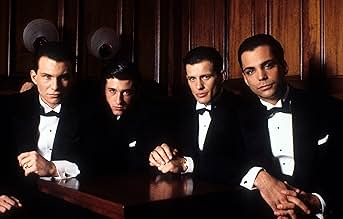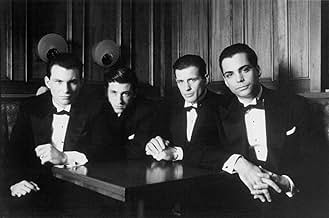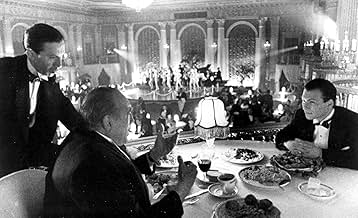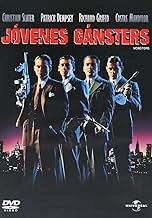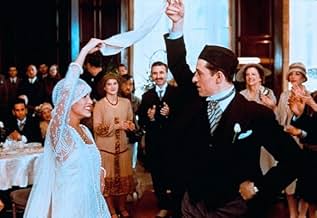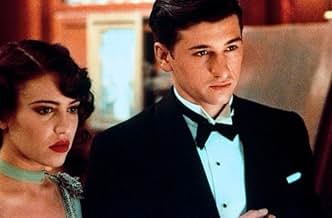Uma história de amizade entre quatro amigos de rua que não se importam em usar a violência para conquistar a vida que desejam. Eles não confiam em ninguém além um do outro, o que é vital par... Ler tudoUma história de amizade entre quatro amigos de rua que não se importam em usar a violência para conquistar a vida que desejam. Eles não confiam em ninguém além um do outro, o que é vital para o sucesso deles como mafiosos.Uma história de amizade entre quatro amigos de rua que não se importam em usar a violência para conquistar a vida que desejam. Eles não confiam em ninguém além um do outro, o que é vital para o sucesso deles como mafiosos.
- Direção
- Roteiristas
- Artistas
- Prêmios
- 2 indicações no total
- Another Italian
- (as Sean Blackman)
Avaliações em destaque
The period is evoked beautifully in shades of brown and cream. Unfortunately many scenes have a certain sameness to them - a couple of hoods meet in some office or hotel for a delicate business chat, each armed to the teeth. When an impass is reached the guns blaze away. This gets boring after a while and you start to wonder why they don't use the phone sometimes. It isn't because the FBI are after them (the IRS was a bit more successful) and they have the New York cops in their pocket. There are some very bloody scenes depicted with gratuitious graphicness.
Luciano and to a lesser extent Lansky are quite sympathetically depicted, with many of the killings being of "let's kill them before they kill us variety." Poor old Tony Quinn is put down not even able to remember the guy whose death is being avenged. One thing that does come out is that organised crime was in the US long before the prohibition era, but the money made then financed the mob into many other areas, pre-eminently gambling in Cuba and Las Vegas. Meyer Lansky was the biggest investor in the early Vegas casino the "Flamingo", opened I think, by Bugsy Siegal.
This is a moderately interesting account, though with some substantial departures from the historical record. Apart from all the gore my objection to it is that it glamourises some very nasty people who did a great deal of damage to American public life. The FBI, and all its attacks on civil liberties, justified its existence by reference to organised crime, yet did little to stop it. After the time covered by the film Luciano was imprisoned not through the efforts of the FBI but through those of NY prosecutor Thomas Dewey. Luciano was eventually deported to Italy, after assisting the OSS, forerunner of the CIA, in their wartime dealings with the Sicilian mafia. Al Capone, a bit player here, was famously imprisoned for tax evasion. Meyer Lansky was charged with tax evasion in the early 1970s, but beat the rap. He died peacfully at 81 in retirement in Florida. His family not only maintain his grave, but also a web site about him.
Michael Gambon and Anthony Quinn play the two old style Mobsters who are rivals for the title of boss of all bosses in the New York City area. Playing Charles Ferranzano and Joe Masseria the two of them control most of the illegal liquor trade which gave organized crime in this country it's real foothold. But our young men prove to be tough, smart and resilient as they play off the two old bosses against the middle.
Mobsters as a film captures the ambiance of New York during prohibition very well. I'm not sure I would have cast Christian Slater as Lucky Luciano, still Slater does very well with the part. Richard Grieco as Bugsy Siegel is very good, you can see the genesis of Warren Beatty's character when he played Siegel in his film, Bugsy.
Note should also be mentioned of F. Murray Abraham as Twenties gambler Arnold Rothstein who was the initial sponsor of the young mobsters in training. And Nick Sadler is one frightening Mad Dog Coll. You'll see quite graphically where his nickname came from.
Mobsters is good viewing, not exactly historically accurate, but actually sticks closer to the truth than most films of this type.
Você sabia?
- CuriosidadesIn real-life, Anthony Quinn was a close personal friend of gangster Frank Costello after the mob boss retired and until Costello's death.
- Erros de gravaçãoBen Siegel is frequently called Bugsy to his face and even refers to himself as Bugsy. In real life Siegel hated his nickname and would not tolerate anyone calling him Bugsy.
- Citações
Bugsy: [to "No-Nose Tony" and the other Faranzano mobsters who've been jumping Rothstein's bootleg-shipments] ... Try this again and I will kill your mothers, fuck your sisters, and turn your brothers into eunuchs!
Lucky: I think you've made your point, Benny. Let's go.
Meyer Lansky: [Then, after Bugsy guns down No-Nose] ... You wanna start a war?
Bugsy: I don't mind.
Meyer Lansky: Well, I do. Sometimes you're so stupid I can't stand it.
- Versões alternativasWas heavily cut to secure an M rating for its Summer 92 Australian theatrical run. The cuts were later restored for its R rated VHS release.
Principais escolhas
Detalhes
- Data de lançamento
- País de origem
- Idioma
- Também conhecido como
- Los jóvenes gánsters
- Locações de filme
- Max Busch House - 160 S San Rafael Avenue, Pasadena, Califórnia, EUA(Luciano's mansion; interior, burned down on October 5, 2005)
- Empresa de produção
- Consulte mais créditos da empresa na IMDbPro
Bilheteria
- Orçamento
- US$ 23.000.000 (estimativa)
- Faturamento bruto nos EUA e Canadá
- US$ 20.246.790
- Fim de semana de estreia nos EUA e Canadá
- US$ 6.030.585
- 28 de jul. de 1991
- Faturamento bruto mundial
- US$ 20.246.790


